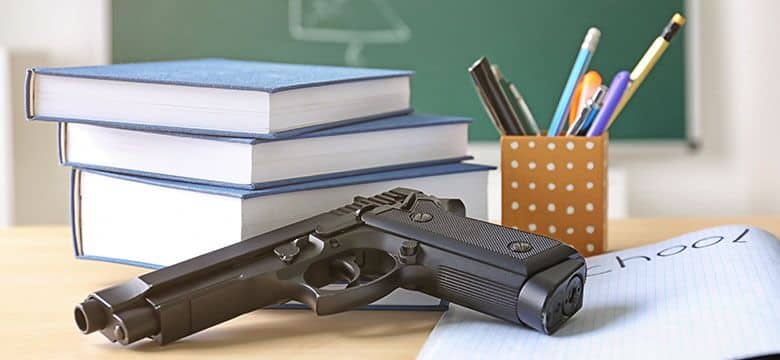In the wake of a shooting at Marjory Stoneman Douglas High School in Parkland, Florida, President Trump suggested arming teachers and school staff to prevent further massacres. Yet, this policy is unlikely to be implemented any time soon – or ever. Regardless of whether putting guns into the hands of teachers would deter school violence, arming educators presents many liability issues that make such a policy unwise. Around 40 states extend a prohibition of guns on school campuses to concealed carry weapon (CCW) holders. Alabama, however, is one of the few states that allows people with CCWs to carry their concealed guns on school property. Thus, it is possible that some Alabama educators and school staff members are already armed.
If you or a loved one was injured in an accident that involved an armed educator, contact the Alabama injury lawyers from Belt, Bruner, & Barnett P.C. at (205) 933-1500 to schedule a free case consultation.
After the Sandy Hook Massacre, Insurance Companies Blocked Arming Teachers
In 2012, after the deaths of 26 students and staff at a school in Sandy Hook, Connecticut, lawmakers across the nation got to work to petition for stricter gun control legislation. Some suggested tougher gun control policies. But in over 30 states, legislation was introduced to arm teachers. Under Alabama Code Section 45-30-103, the principals of schools in Franklin County were allowed to create volunteer armed emergency security forces drafted from the ranks of current and former school staff.
But nowhere in the country has arming teachers in the classroom been standard policy. The reason is that insurance companies are having none of it. “Concealed handguns on school premises pose a heightened liability risk,” the insurer EMC informed the government of Kansas, which passed a law allowing schools to arm their teachers.
Some states that considered arming their teachers dropped the idea after pushback from their insurance companies. The risk of losing insurance and being exposed to huge liabilities outweighed the security benefits of having guns on campus, especially since those security benefits may not be significant.
Security Experts are Skeptical About Putting Guns in the Hands of School Staff
School security consultant Ken Trump is not surprised by the reluctance from insurance companies, stating that the idea of “providing teachers, principals, custodians or other school staff with eight, 16 or even 60 hours of firearms training on firing, handling and holstering a gun somehow makes a non-law enforcement officer suddenly qualified to provide public safety services is an insult to our highly trained police professionals and a high risk to the safety of students, teachers and other school staff.”
Tellingly, legislation that would arm teachers is vague about many specific issues that pertain to balancing the risk of an accident and the ability of teachers to effectively respond in an emergency. No one seems to know the answers to questions such as where the guns should be kept, whether they should always be loaded, and what are the rules of engagement. In a crisis, the police would need to be able to distinguish armed teachers from possible attackers, which raises the issue of whether armed teachers would need to wear uniforms.
Public Schools Have Good Legal Standing to Avoid Liability over Guns in Schools
Public schools enjoy protection from lawsuits that would arise out of a death or injury occurring because of a teacher or staff member’s firearm. As state actors, public schools cannot be held liable for the negligence of its employees. This means that if a teacher accidentally shoots a student, it will be very difficult to sue the state or the school board for compensation.
Courts would likely view armed public school teachers as they do police officers, who cannot be held liable for accidental shootings unless their actions shock the conscience, are contrary to clearly established law, or were made according to a custom or policy that was developed with deliberate indifference to the rights of those concerned. Thus, a lawsuit would need to show that legislators and rule makers turned a blind eye to obvious risks to students when they created the policies that armed teachers follow.
Because of their status as state actors, public schools are vulnerable to lawsuits that allege a violation of the Constitution and the civil rights that it guarantees. However, the Constitution’s guarantee that the government will protect the “life and liberty” of its citizens does not create a duty to defend against private violence. Therefore, a school cannot be held liable for a teacher’s failure to stop a shooting, just like you cannot sue the police for not stopping a murder.
Belt, Bruner, & Barnett P.C. Can Help
At Belt, Bruner, & Barnett P.C., we have a proven track record of holding both private and state actors accountable for their wrongdoing. If you or a loved one has been injured at school, it may be possible to obtain compensation. Contact our Alabama personal injury lawyers today at (205) 933-1500 to schedule your free consultation.
